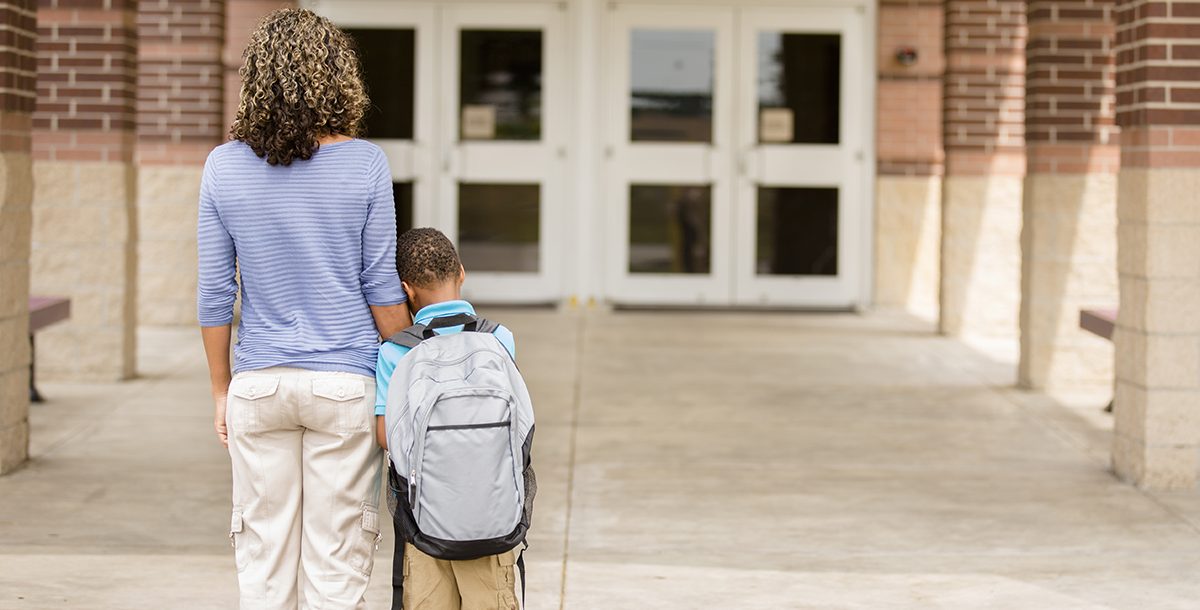When the summer days dwindle down and the new year looms, it’s not unusual for kids to feel some amount of school anxiety and stress.
This condition can affect children of all ages and often shows up as emotional distress, physical symptoms, or even school avoidance. Understanding what school anxiety is, how it manifests and how to manage it can make a world of difference for both kids and parents.
Is your child showing signs of having anxiety about school? Make an appointment with their pediatrician or family medicine provider.
What is school anxiety?
School anxiety is a form of stress that children experience in relation to school. It can stem from academic pressure, social challenges, fear of separation or even changes in routine. Separation anxiety is common among younger children, while older students may worry about performance, peer relationships or bullying.
Signs to watch for
Recognizing the signs of school anxiety is the first step toward helping your child. These may include:
- Frequent complaints of stomach aches or headaches
- Trouble sleeping or changes in appetite
- Avoidance of school-related activities
- Excessive worry about school performance or social interactions
- Emotional outbursts, unexplained crying or clinginess before school
- Difficulty concentrating, restlessness or fidgeting
If these symptoms persist, it may be time to seek professional support. When anxiety leads to school avoidance, intervention is crucial.
Why is your child nervous to go back to school?
Whenever a new situation arises in life, it’s not unusual for nerves to set in. With the new school year, kids face a new classroom, a new teacher, new classmates and other unknowns that may make them worry and feel overwhelmed. Not knowing exactly what to expect causes discomfort for many people, kids included.
Many schools offer a chance for students to see their new classroom and meet their new teachers ahead of time, so take advantage of those opportunities. Also, try to discuss anything new and unfamiliar with your child so they have a chance to talk things out.
How to help your child deal with school anxiety
The first step in dealing with anxiety is to recognize the signs. Kids often feel these uncomfortable feelings, but they don’t know how to express them in words. Instead, they act them out. If you see these signs in your child, some ways to help include:
- Talk it out: Encourage your child to talk about uncomfortable feelings. Ask specific questions, such as whether they’re nervous about making friends or having a new teacher. Listen carefully to what your child tells you and don’t judge. Often, the chance to talk about nervousness about the first day of school can provide extra support and reduce anxiety.
- Normalize their experience: Let your child know that feeling anxious is normal. Share your own experiences with anxiety and how you overcame them. This helps children feel less alone and more understood.
- Be positive: While anxiety is normal, reframing the situation can help to ease their uneasiness. Go back-to-school shopping for new clothes, shoes and school supplies with them. Talk about the fun things to look forward to in school, like seeing old friends, playing on the playground at recess time, going to art class and visiting the school library.
- Prepare: Visit the school before the first day. Meet the teacher, explore the classroom and walk through the daily routine. Plan school lunches with your child. Set up a spot in your house for homework with all the materials your child will need.
- Develop a routine: Predictability helps children feel secure. A couple of weeks before the first day of school, change your child’s daily schedule. Go back to an earlier bedtime and wake your child up in the morning, around the time necessary to get up for school.
- Practice separation: Gradually increase time apart from your child to help them get used to being away from home. Start with short playdates or time at a relative’s house.
What about social anxiety?
Your child’s back-to-school nerves may be due to being uncomfortable with socializing. While it may look like simple shyness on the outside, it may be anxiety and fear that set in during specific social situations.
Social anxiety may involve difficulty with:
- Going to parties
- Speaking in public
- Walking into rooms
- Talking to strangers
- Starting conversations
- Eating with other people
- Making eye contact with others
It’s common for people with social anxiety to be afraid of being watched and judged by others, of being embarrassed and of being the center of attention. It may help for your child to talk about these uncomfortable feelings. Reassure your child that everyone feels this kind of social nervousness sometimes.
How we can help
It’s pretty normal for your child to feel some school anxiety, especially at the beginning of the year when there are a lot of changes happening at once.
However, if your child’s anxiety begins to interfere with their daily life, make an appointment with their pediatrician or family medicine provider. They may refer you to a mental health professional for more specialized care.
Learn about the pediatric and family medicine services we provide at Bon Secours.





